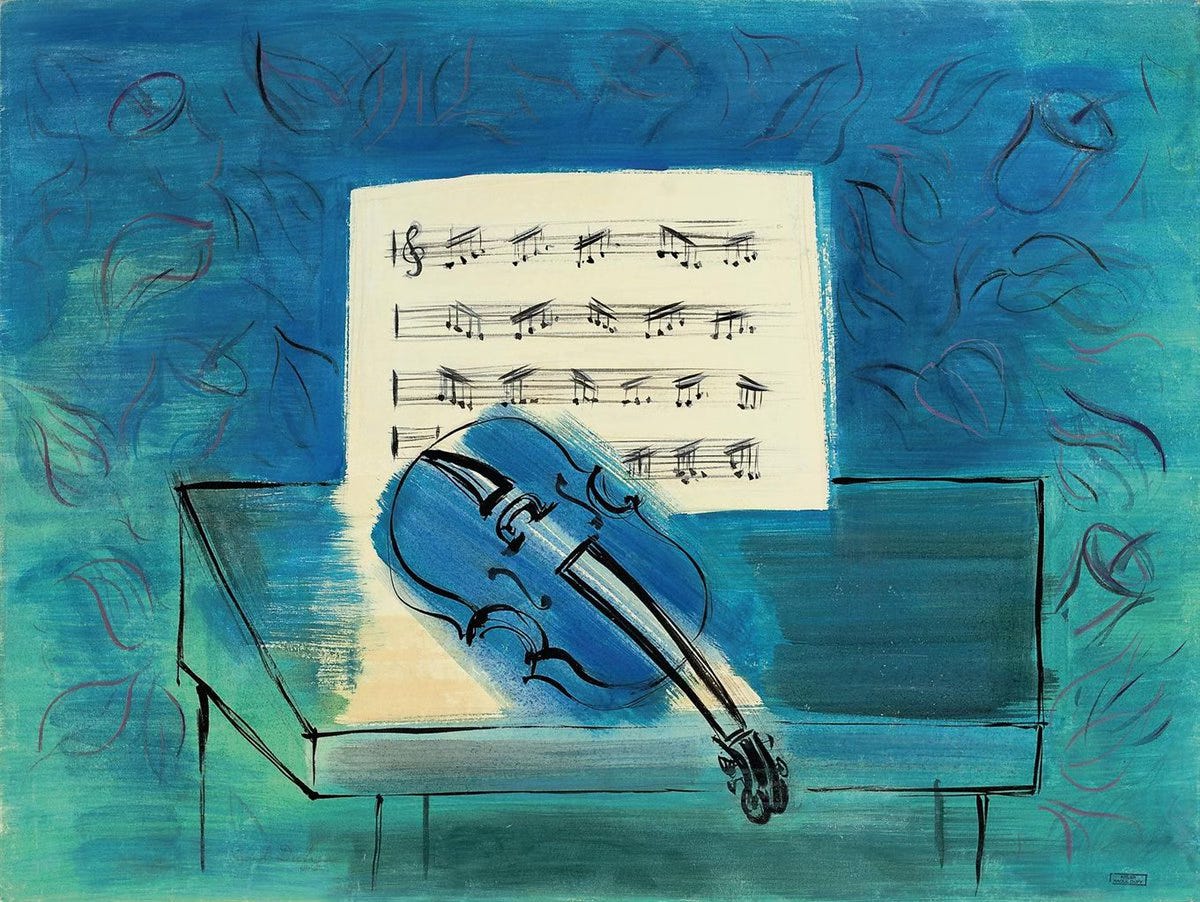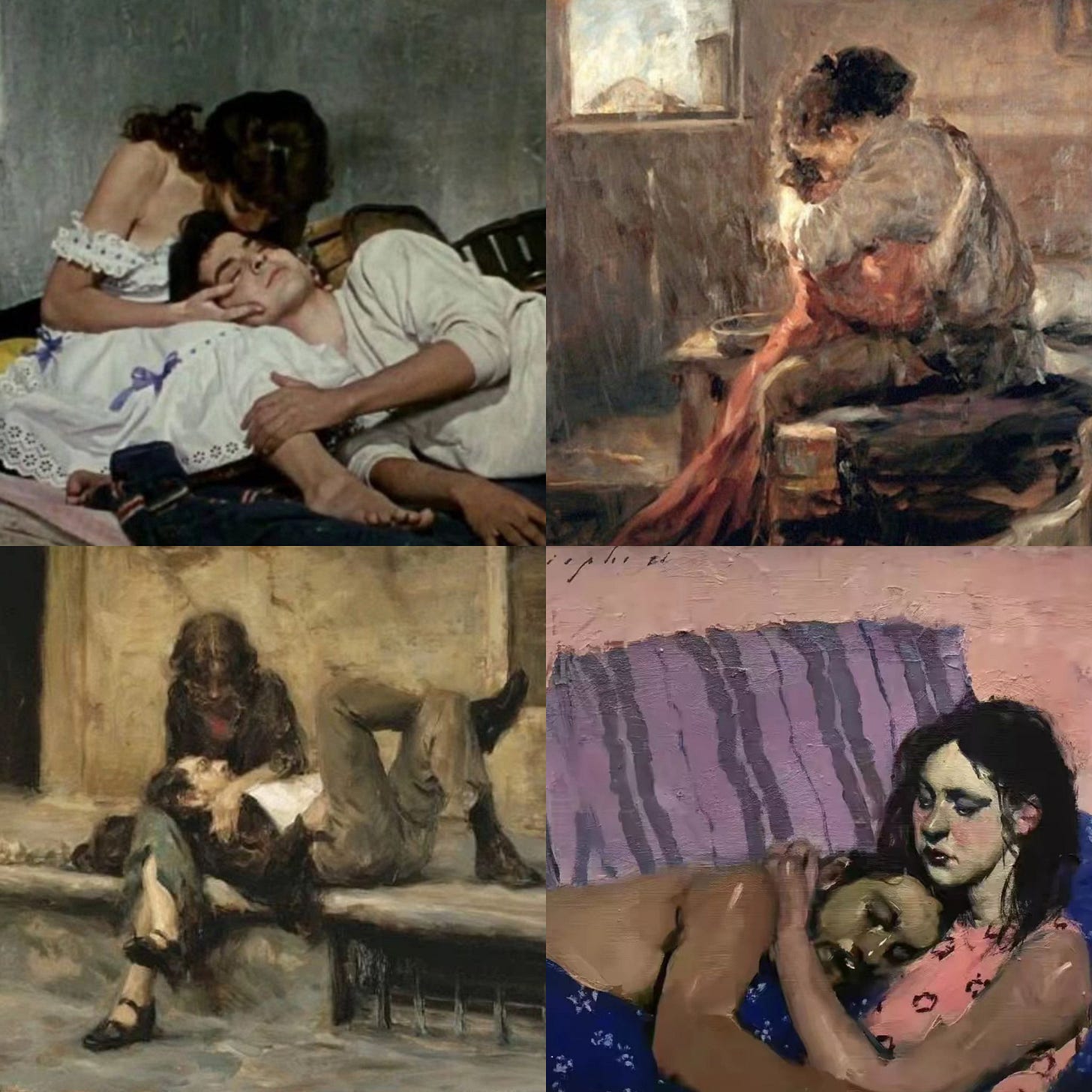Why on earth do we listen to sad music?
The answer is life-changing, and little-understood.
For our next Sunday Candlelight Chat, we’re honored to host Sharon Salzberg (!!!) (one of the world’s leading meditation teachers), on April 14, at 1 pm ET.
To participate (and to receive the video replays if you can’t attend), you’ll just need a paid or scholarship subscription to the Quiet Life. We put a ton of daily labor (of love) into this work, and truly appreciate your support.
Taylor Swift. Nina Simone. Leonard Cohen.
Why exactly do we listen to sad music?
It doesn’t make sense, does it?
No one - I mean no one - wants to feel sad.
But the answer to this question is one of the most life-changing, and least understood, phenomena that I’ve ever come across.
*
One of my favorite YouTube videos shows a two-year old boy, with round cheeks and blond hair so fine you can see the pink of his scalp, hearing Moonlight Sonata for the first time. He’s attending a piano recital, and the young player offscreen is making a hash of the Beethoven. You can tell that the 2-year old knows this is a solemn occasion and he’s supposed to be quiet. But he’s so moved by the haunting melody that his whole face strains with the doomed effort not to cry. He lets loose a whimper, and then the tears stream silently down his cheeks. There’s something profound, almost sacred, in his reaction to the music.
The video went viral, with the many commenters trying to figure out the meaning of the boy’s tears. The occasional snarky comment aside (“I’d cry too listening to all those wrong notes”), most people seemed to sense that the best of humanity, and its deepest questions, lay written like a secret code in the boy’s sorrow.
Was sorrow even the right word? Some commenters spoke of the boy’s sensitivity, some of his empathy; others spoke of rapture. One marveled at his reaction to “the paradoxical and mysterious mix of intense joy and sadness” in the music: “Such things have made the lives of generations of people worthwhile.”
This idea seems, to me, closest to the mark: but what is it, exactly, that makes bittersweet music like Moonlight Sonata so exalting? How can the same stimulus speak simultaneously of joy and sorrow, love and loss – and why are we so keen to listen?
It turns out that lots of people feel the way this child (and I) do. Sad music is much more likely than happy to elicit what the neuroscientist Jaak Panksepp called that “shivery, gooseflesh type of skin sensation” otherwise known as “chills.” People whose favorite songs are happy play them about 175 times on average. But those who favor “bittersweet” songs play them almost 800 times (!!!) according to a study by University of Michigan professors Fred Conrad and Jason Corey, and they report a “deeper connection” to those songs than those whose favorites made them happy. They tell researchers that they associate sad music with profound beauty, deep connection, transcendence, nostalgia, and common humanity – the so-called “sublime” emotions.
This phenomenon extends to other aesthetic forms, too. So many of us love tragic drama, rainy days, cherry blossoms – we even hold festivals in their honor – preferring them to equally lovely flowers because they die young. (The Japanese, who love sakura flowers most of all, attribute this preference to mono no aware, which means a desired state of gentle sorrow brought about by “the pathos of things” and “a sensitivity to impermanence.”).

*
Philosophers call this the “paradox of tragedy,” and they’ve puzzled over it for centuries. Why do we sometimes welcome sorrow, when the rest of the time we’ll do anything to avoid it? Now psychologists and neuroscientists are considering the question, too, and they’ve advanced various theories: A moonlit sonata can be therapeutic for people experiencing loss or depression; it can help us to accept negative emotions rather than ignoring or repressing them; perhaps it restores our bodies to homeostasis.
Yet these theories miss an important clue: the moonlight sonatas of the world don’t simply discharge our emotions; they elevate them. It’s only sad music that elicits exalted states of communion and awe. Music conveying other negative emotions, such as fear and anger, produces no such effect.
Even happy music produces fewer psychological rewards than sad music, according to the neuroscientists Matthew Sachs and Antonio Damasio, and the psychologist Assal Habibi.
Upbeat tunes make us want to dance around our kitchens and invite friends for dinner. But it’s sad music that makes us want to touch the sky.
*
I’ve been studying the paradox of tragedy for the last decade. And I believe that the answer has lain waiting for us all along, not (solely) in the realms of psychology and philosophy — but in the realm of spirituality. And that this is true, whether or not we’re “religious”.
The grand unifying theory that explains the paradox of tragedy is (like most such theories) deceptively simple: We don’t actually welcome tragedy per se. What we like are sad and beautiful things – the bitter together with the sweet. We don’t thrill to lists of sad words, for example, or slide shows of sad faces (researchers have actually tested this). What we love is elegiac poetry, seaside cities shrouded in fog, spires reaching through clouds.
In other words: we like art forms that express our longing for union, and for a more perfect and beautiful world.
When we feel strangely thrilled by the sorrow of Moonlight Sonata, it’s the longing for love that we’re experiencing – fragile, fleeting, evanescent, precious, transcendent love.
*
The operative word in that sentence is not “love,” but “longing.”
The idea of longing as a sacred and generative force seems so odd, in our culture of normative sunshine.
But longing is momentum in disguise: it’s active, not passive; touched with the creative, the tender, and the divine. The word longing derives from the Old English langian, meaning “to grow long,” and the German langen – to reach, to extend. The word yearning is linguistically associated with hunger and thirst, but also desire. In Hebrew, it comes from the same root as the word for passion.
Indeed, the idea of a transcendent longing has traveled the world for centuries, under many different names, taking many different forms. Writers and artists, mystics and philosophers, have long tried to give voice to it. Garcia Lorca called it the “mysterious power which everyone senses and no philosopher explains.” The artist Peter Lucia described it as the answer to a cosmic mystery. “I feel that the secret of life, love, death, life’s paths taken or not taken – the Universe itself – is somehow embraced in its achingly beautiful promise,” he wrote. My favorite musician Leonard Cohen said that his favorite poet Garcia Lorca taught him that he was “this aching creature in the midst of an aching cosmos, and the ache was okay. Not only was it okay, but it was the way that you embraced the sun and the moon.”
Longing also shows up quite often in the form of carnal love. In this extraordinary passage, the novelist Mark Merlis describes the strange ache that can come from meeting someone irresistible:
“Do you know how sometimes you see a man, and you’re not sure if you want to get in his pants or if you want to cry? Not because you can’t have him; maybe you can. But you see right away something in him beyond having. You can’t screw your way into it, any more than you can get at the golden eggs by slitting the goose. So you want to cry, not like a child, but like an exile who is reminded of his homeland. That’s what Leucon saw when he first beheld Pyrrhus: as if he were getting a glimpse of that other place we were meant to be, the shore from which we were deported before we were born.” [Emphasis added.]
Are you an artist, a writer, a creative? Longing is the ultimate muse. “My artistic life,” says the songwriter-poet Nick Cave, “has centered around the desire or, more accurately, need to articulate the feelings of loss and longing that have whistled through my bones and hummed in my blood.” The pianist and singer Nina Simone was called the “high priestess of soul” because her music was full of longing for justice, and love. The Spanish call it duende: the yearning, burning center of flamenco dance and other art forms of the inflamed heart. And in Hinduism, viraha – the pain of separation, usually from the beloved – is said to be the source of all poetry and music. Hindu legend says that Valmiki, the world’s first poet, was moved to verse after watching a bird weeping for her mate, who’d been making love to her when he was killed by a hunter.
“Longing itself is divine,” says the Hindu spiritual leader Sri Sri Ravi Shankar. “Longing for worldly things makes you inert. Longing for Infinity fills you with life. The skill is to bear the pain of longing and move on. True longing brings up spurts of bliss.”
*
But even music - so transcendent, for so many of us - is only an expression of that which we long for; the real question is, what is “that”? We can say “1/2” or “0.5” or “one half,” and these are all expressions of the same thing, but what is the thing itself? The fractions, decimals and words describe the essence of a mathematical concept that remains just as ineffable after we express it.
But every flower we arrange in a vase, every painting we hang just so in the art museum, every newly dug grave over which we weep – they’re all expressions of the same elusive yet wondrous thing.
So: How should you go about finding that elusive, yet wondrous thing?
The ancient Greek term for sacred longing was pothos; in Homer’s Odyssey, it was the activating force that set the homesick Odysseus on his journey back to Ithaka.
In other words, it was longing for home, that carried Odysseus to his actual home - and his arrival there was never the point of the story.
The odyssey was the story.
*
So let me ask you (and as always, I love to hear your thoughts, via the comment section):
What odyssey are you on?
Where is your home?
And how are you going to get there?
P.S. The above is adapted, with brand-new thoughts woven in, from my book, BITTERSWEET. I’m best known for my book QUIET (which don’t get me wrong I regard as one of my precious children) but to me, some of the most important work I’ve ever done is on spiritual and existential longing.






This spoke to my soul, Susan. The ecstasy of the bittersweet. The ache of joy. The pain of spiritual desire. My journey? Approaching the age of 71, I am feeling like I am finally coming home to myself. The self that I have tried to change, alter, twist and bend in efforts to be what I thought I should be. And now, realizing, that the journey has been to accept who I am, love who I am, express who I am, and sit with the poignancy of all of this as I approach the end of the road here on earth. Exquisitely aware of the joy of self discovery, the joy of connection with the earth and its trees, plants, and creatures. And the awareness of the temporariness of it all. To reach that simultaneous time of hello and anticipated goodbye. To love fiercely with a soft touch and not a strong grip. To feel boundaries while also anticipating losing all boundaries. To feel alive in the face of the reality of death. And be moved to tears with the beauty, the sadness, the feeling that cannot be described.... To be grateful for this moment and everything that it contains.
Reading this reminded me of a parallel in the movie “Inception.” [Not a spoiler…] In the movie, there were places people would go to be put into deep sleep for long periods of time, not so they could dream but rather so they could wake up and know what reality is.
Similarly, I tend to listen to happy music *when* I feel something; I listen to sad music *in order to* feel something.